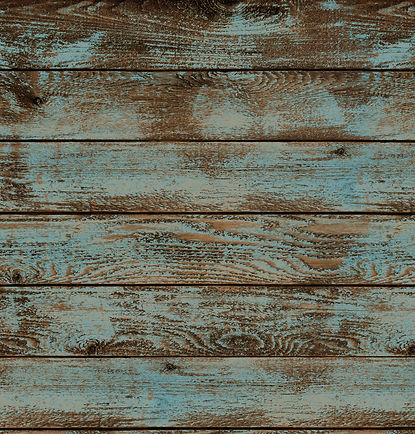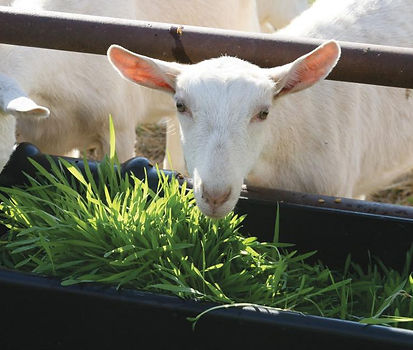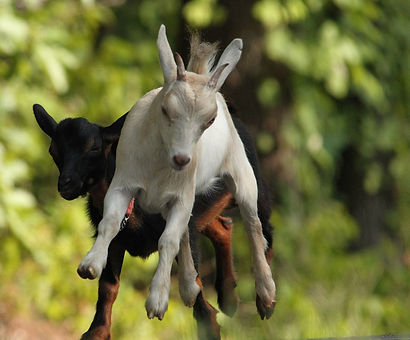Healthy Goats = Happy Goats
One of the most difficult things about raising goats in any kind of managed environment is making sure the forage meets their high nutritional needs. At Sun Roads Farmory, we understand that can be a daunting task. However, we also feel we can help you meet those high standards.
To begin addressing this issue, let’s very briefly look at three areas that can be a problem when managing your herd’s nutrition:


1. Parasite control is something that we know to be monumental when raising goats. The life cycle of the problematic worms is 3 weeks. However, not everyone has the amount of land necessary to rotate fields every three weeks as recommended. With these parasites naturally comes anemia. Recovering from anemia is a long-term process for goats as well as a very expensive one.
2. There are many areas in the country where the soil doesn’t contain the nutrients and minerals that it once did. Iron and copper are deficient in most places. Vast areas of the earth are completely void of cobalt. We know iron is especially important if anemia is a concern, as well as for maintaining good animal health. Copper is very important for proper fetal development. Ruminants, like goats, use cobalt in their rumen to produce vitamin B12. When we don’t have the proper soil to grow the browse or forage for our goats, they become deficient in these minerals, leading to health problems!
3. Goats naturally thrive in dry lands! However, that makes producing food locally for them difficult. Feed prices are climbing to all-time highs across the United States. Finding feed that ensures our herds’ health while still being affordable is becoming increasingly difficult.
Feed sprouted in one of our AFS units has never sat on the ground or had the opportunity to become infested by parasites or their eggs. You are feeding freshly grown, parasite-free feed daily! This drastically decreases the anemia risk and health complications that go with it. The need for pasture rotation has just been decreased significantly!
Spouting grains significantly increases the level of nutrients the animals receive vs. if they were to eat the grain unsprouted. Barley grass, for example, is nutritionally superior! It has very high levels of iron, copper, and cobalt. It is very high in calcium, magnesium, zinc, and selenium as well. Dairy cattle farmers have coined the phrase, “Dr. Green”, for Spring grass. They refer to young grass in this way due to the noticeably improved health of their cows when turned out on Spring grass. Rumens were simply meant to function on living plant material and the improved health of the animal proves that time and again!
Sprouting grain in one of our AFS units makes growing fresh, highly nutritious food for your herd simple and consistent no matter the amount of land available, the climate, or the soil conditions. We do this with a huge cost savings for you!
We've Got the Answer
Health Benefits for Your Goats
Whether raising goats for meat, dairy, fiber, or show, their bodily confirmation and productive longevity are direct reflections of their nutritional health status. Studies have shown that when goats are raised on sprouted feed, they have a faster, more consistent weight gain. They gain weight the way the animal was meant to… in muscle matter rather than fat accumulating under the skin and around the internal organs of the body.
The quality of meat rises exponentially as a direct result of feeding sprouted grains. Finishing goats on high amounts of grain is not an effective way to “marble” the meat. It simply does not work like it does with cattle and sheep!
Dairy goats eating sprouted grain vs. unsprouted grain have an increase in milk production as well as an increase in quality the of the milk.
Goats on sprouted grains have a better coat and healthier hooves. In addition, fertility rates and healthy, live birth rates are much improved.
Goats are a bit different... but you already knew that!
Never before have we had the opportunity to share a good recipe! But thanks to our Caprine friends, today is our first!

As you know, goats are foragers and browsers, not grazers! They like the “net veins” in leaves much more than the “parallel veins” in grasses. They prefer not to eat close to the ground which helps keep them parasite free. But this is more than just a matter of being picky eaters. They were made with those taste buds for a good reason!
The micro-organisms in a goat’s rumen can easily break down the leafy material between the veins you see in a leaf. However, the parallel veins in MATURE grasses are higher in non-digestible lignin and are much harder for a goat’s rumen to break down and use the nutrients available in that plant.
But that is not cause for concern with our sprouted grains and seeds! Let me explain 2 things:
1. YOUNG grasses are very beneficial to a goat’s system! The lignin in the parallel veins is MUCH lower than in mature grasses. These young grasses can be broken down and digested easily and provide the long fiber that the goat needs to maintain the rumen’s functionality! However, no matter the fantastic amounts of nutrition in the barley grass, if your goat won’t eat it, it doesn’t matter.
2. Goat owners that are using our systems are feeding a “recipe” that their herds love! The health benefits are amazing and the goats are thriving using a mix of lentils, oats, and winter peas along with the barley grass. The sprouted lentils are high in iron and copper. Sprouted peas are high in protein, iron, and healthy fats. No wonder the goats love this mix! It’s superior nutrition!
There is no doubt that your goat herd will thrive on our sprouts. However,there is even more to consider. On our you will find a wealth of information regarding exactly what happens to the goats' bodies when they consume grain. We believe the nutritional facts absolutely speak for themselves. In addition, you will love the money you'll be saving! (Keep reading for an amazing price breakdown!)

SRF Goat Blend
40% barley
30% lentils
20% winter peas
10% oats
The Bottom Dollar...
Are you ready for this?
We’ve talked about nutrition and animal health. But I know the first thing I like to know is, “Exactly what is this going to cost me?”
You should sit down...
23 cents per goat per day!
I promise this in not a “sales trick or gimmick”. If you are still feeding your goats grain every day, the average price you’re most likely paying is 32-84 cents per day per goat. How about Purina or DuMor goat feed? The average daily amount is 2# per day per goat. Cost? 73 cents per day per goat. Yes, really! If you’re feeding 30 goats per day, that’s $21.90. For $8.09 ($6.09 for the seed, $2 for electricity), you can grow your own sprouts in one of our units and feed 27 goats! I won’t mention that you’re feeding them the kind of food they were actually meant to eat... Food that is superior nutrition! (... And you’re saving about $13 a day!)
Out of curiosity, have you ever read the ingredient list on the label of that goat feed you’re using? Also, please don’t forget what the phylates and enzyme inhibitors in all that grain do to the goats’ rumens! (That information is on the nutrition page.) Our feed is not only incredibly high in nutrition, but it is also very affordable. The health benefits to your herd are amazing! You will love the results you see!
We would love to discuss this with you! We have a complete price analysis, broken down into individual grain percentages and prices, that we can email or “snail-mail” as well. We’ve got all the figures that you might need to help you make your decision!
Lastly, our machines are very versatile. Our smallest machine will feed up to 18 goats per day! Our largest machine will feed up to 189 goats per day! We have a few in the middle as well... visit our page. I’m sure we can meet the needs of your specific herd!
(These figures are based on a 200# meat goat or a 130# dairy goat. We recommend feeding sprouts at 2-3% of the goats’ body weight per day for meat goats, and 3-5% for dairy goats. Again, we have documented info on this we’d love to share with you! ...just for the asking!)
